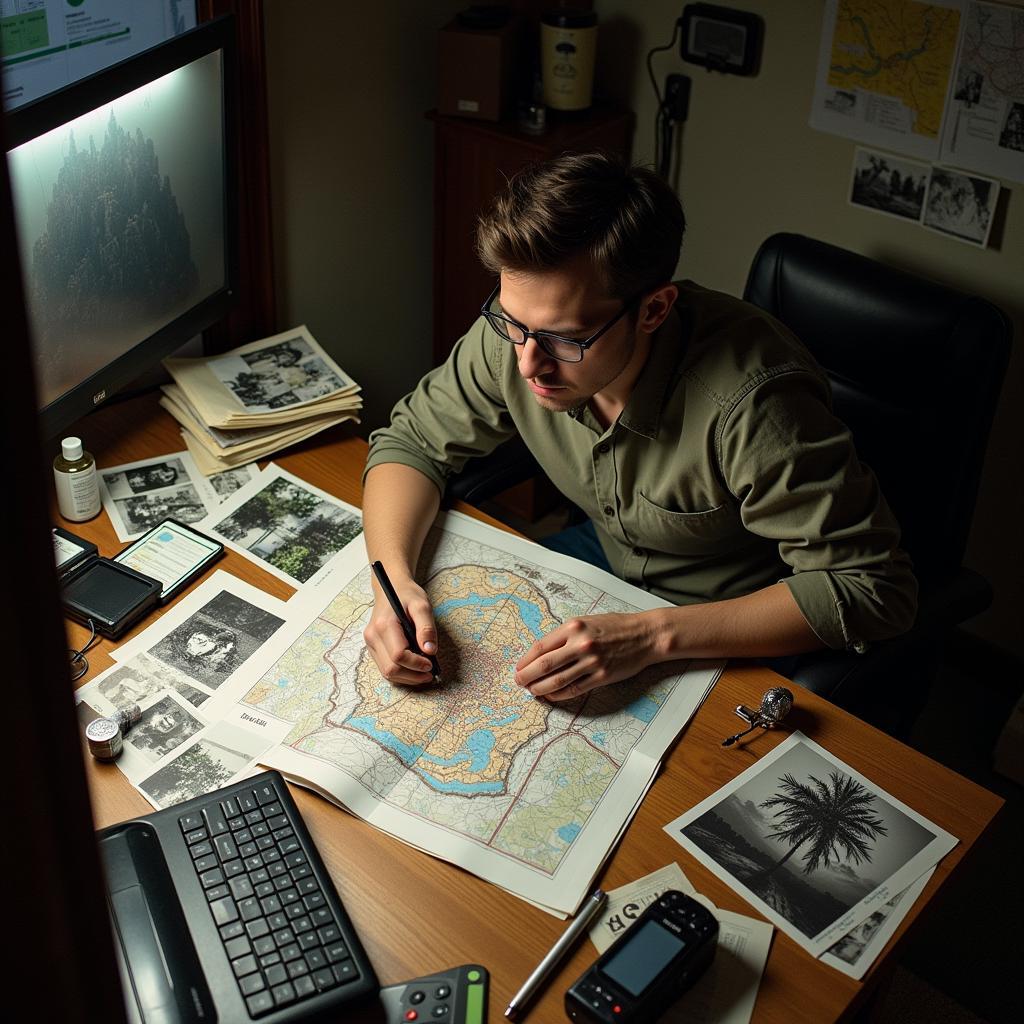The world of paranormal research, much like our own, thrives on order and meticulous investigation. This is where a Research Design Specialist comes in. A research design specialist acts as the architect of investigations, ensuring every study is structured to yield reliable and insightful results. They are the backbone of any serious attempt to understand and document unexplained phenomena.
The Architect of Paranormal Inquiry: A Closer Look at the Research Design Specialist
 Paranormal research specialist meticulously planning an investigation
Paranormal research specialist meticulously planning an investigation
A research design specialist in paranormal investigation isn’t your typical academic. They blend a deep understanding of scientific methodology with an openness to the unknown. Their expertise lies in crafting research plans that balance rigorous scientific principles with the unique challenges of studying phenomena that often defy easy explanation.
What Makes a Research Design Specialist in Paranormal Studies Unique?
This isn’t just about collecting ghost hunting gadgets and venturing into the unknown. A research design specialist in this field needs a diverse skillset:
- Understanding of Scientific Methodology: They are well-versed in various research methods, from qualitative analysis of witness testimony to quantitative data collection using EMF meters and other tools.
- Adaptability and Creativity: Paranormal phenomena are unpredictable. A research design specialist needs to think on their feet, adjusting protocols and methodologies as new information emerges during an investigation.
- Critical Thinking and Objectivity: Separating genuine anomalies from hoaxes or misinterpretations is crucial. They approach each case with a healthy dose of skepticism, always searching for evidence-based explanations.
- Ethical Considerations: Respect for the unknown extends to potential entities and the individuals involved. The research design specialist ensures ethical data collection and handling, respecting privacy and informed consent.
Key Responsibilities of a Research Design Specialist: Building the Framework for Discovery
 A research team huddled together, reviewing data collected from a paranormal investigation
A research team huddled together, reviewing data collected from a paranormal investigation
- Defining Research Questions: What are we trying to understand? The specialist helps formulate clear, researchable questions that guide the investigation.
- Selecting Appropriate Methods: From interviews and observations to technical readings and experimental setups, they choose the most effective ways to gather data.
- Developing Data Collection Tools: This might involve creating questionnaires, designing experiments, or even building custom equipment tailored to the specific needs of a paranormal investigation.
- Data Analysis and Interpretation: Once data is collected, the specialist helps make sense of it, identifying patterns, drawing conclusions, and generating further research avenues.
The Impact of a Research Design Specialist: Advancing the Field
A well-designed research plan is essential for moving beyond anecdotal evidence and sensationalism. By adhering to rigorous methodologies, research design specialists lend credibility to paranormal investigations, helping to:
- Standardize Data Collection: Consistent methods across investigations allow for comparisons and the identification of larger trends.
- Improve Data Reliability: By minimizing bias and errors, the research design specialist ensures that findings are more likely to be accurate and trustworthy.
- Advance Understanding: Methodical research paves the way for new discoveries and deeper insights into the nature of paranormal phenomena.
Research Design in Action: A Glimpse into the Process
Let’s say a team is investigating reports of a haunted house. A research design specialist might:
- Review Historical Records: Uncovering past events or tragedies associated with the location.
- Interview Witnesses: Gathering firsthand accounts of experiences and potential paranormal activity.
- Design Experiments: Setting up controlled conditions to test for electromagnetic anomalies, temperature fluctuations, or other unusual phenomena.
- Analyze Audio and Visual Recordings: Examining footage for evidence of unexplained voices, apparitions, or other anomalies.
The Future of Paranormal Research: Embracing Rigor and Collaboration
The field of paranormal research is evolving. The involvement of research design specialists signifies a shift towards a more scientific and evidence-based approach. As we delve deeper into the mysteries of the unexplained, their expertise will be invaluable in separating fact from fiction and pushing the boundaries of our understanding.
FAQs: Unraveling Common Questions About Research Design Specialists
What qualifications does a paranormal research design specialist need?
While there’s no official degree, a strong foundation in research methodology (perhaps a degree in psychology, sociology, or a related field) is highly beneficial. Experience with data analysis and a passion for the paranormal are also key.
Can anyone become a research design specialist in this field?
Absolutely! While formal education is helpful, a dedication to learning, a critical mind, and a willingness to embrace the unknown are essential qualities.
How can I learn more about becoming a research design specialist?
Connecting with experienced paranormal investigators and researchers is a great start. Consider joining a local paranormal research group or exploring online resources and courses dedicated to paranormal research methods.
Need help with a paranormal investigation or want to learn more about the role of a research design specialist? Contact us at:
Phone Number: 0904826292
Email: research@gmail.com
Address: No. 31, Alley 142/7, P. Phú Viên, Bồ Đề, Long Biên, Hà Nội, Việt Nam.
Our dedicated team is available 24/7 to assist you.
Further Reading:
For more insights into the world of paranormal research and career opportunities, check out:
We are committed to supporting your journey into the fascinating world of Paranormal Research.